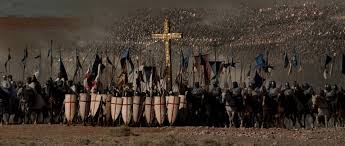The Lie of the Second Sons April 11, 2016
Author: Beach Combing | in : Medieval , trackback
When Beach wrote his university entrance exams, many decades ago, he waxed unlyrical about Europe’s second sons who went on crusade because there was nothing for them at home. There might have been some genuine pent up passion about killing Moors or walking where He walked, but it was really all about filthy lucre. The last thirty years of research have suggested that the second sons explanation just does not stand up: though it will still be repeated in history text books for another fifty years or say. (Beach will take bets). Historians, perhaps most effectively Jonathan Riley-Smith, have got their hands dirty. They have sifted through the knights who actually went on crusade and have shown that: (i) these were more often than not first sons; and that (ii) crusading was an incredibly expensive business; and that (iii) the vast majority of those who survived (perhaps 50% of crusaders died on the First Crusade) in any case went home.
The second and third point are not of critical importance on their own: what matters, after all, is not what the crusades cost, but what crusaders anticipated the net economic result to be: likewise just because Europeans headed home does not mean that they had necessarily intended to do so when they set out. We must constantly remind ourselves that the crusades were something entirely new: a sword grafted uneasily onto the tree of pilgrimage. Everyone, popes, warriors and Muslims were making it up as they went along. Historians may or may not know the past, but our subjects certainly do not know the future.
The data, though, on first sons is convincing: in fact it is all but unassailable. (It would be more interesting to ask how many of those who stayed in Outremer, outside the military orders were second sons.) Where then did the myth come from? Part of it seems to have been economism, the tiresome sub-Marxist mistake of explaining all human motives with reference to money. There may also have been a false contemporary parallel in the nineteenth century when the historiography on the crusades was hardening. In that period there was a very genuine second son phenomenon in Europe. If you were the squire’s first son, you became squire: if you were the squire’s second son you went and opened a rubber plantation in Malaysia. How natural that the crusaders would have done the same? In fact, in the Mediterranean European colonialism was often compared, rather crazily, to the crusades.
Other thoughts on second sons: drbeachcombing At yahoo DOT com


